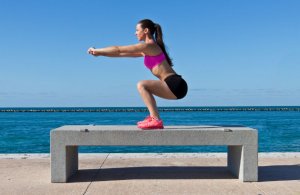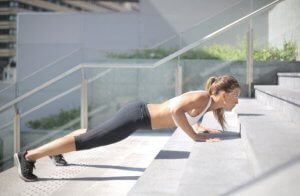Tips for Outdoor Calisthenics Workout

Outdoor calisthenics is a great way to build muscle without going to the gym. Calisthenic workouts are dynamic exercises that will keep you fit and healthy using your own body weight and little to no equipment.
If performed on a regular basis, calisthenics can improve aerobic capacity, endurance, coordination, and strength. The exercises can be performed in the open air, and according to your own intensity level and rhythm. Keep reading to learn some tips for outdoor calisthenics.
Tips for outdoor calisthenics
1.-Do the exercises correctly
Our most important tip for getting the best results possible from your calisthenics routine is to do the exercises correctly. By making sure you’re doing the exercises the way you’re supposed to, your muscles will develop and you’ll get the most out of your workout. Quality is more important than quantity, so it’s essential to be careful about what you’re doing.

2.-Choose a good workout routine
If you’re a beginner, a calisthenics workout means learning new skills through repetition and gradual progression. Start with some basic exercises and progress at a steady, natural rhythm. It might take time for you to master some of the moves, so it’s important not to start with the most advanced routines.
“There may be people who have more talent than you, but there’s no excuse for anyone to work harder than you.”
– Derek Jeter–
3.-Results aren’t immediate
One point to keep in mind to stay motivated is that getting results takes time. if you want to improve, you have to increase your sets and intensity gradually, and keep progressing. You can then start adding in variations that work your body harder.
4.-Don’t compare yourself to others
It’s important not to compare yourself with others. That means the only person you should measure yourself against is you. Use your own personal progress to motivate and inspire you rather than how you compare to anyone else.
Falling in the trap of measuring yourself against other people can be depressing and demotivating. Remember, this about becoming a better version of yourself, so if you’re improving that’s all that matters.
5.-A good warm-up is essential
Finally, don’t forget that with a calisthenics workout, you must stretch before and after. A good warm-up is the only way to avoid injury and muscle cramps. And, as an added bonus, stretching also improves flexibility and helps improve your muscles’ recovery time.
What are the basic calisthenic exercises?
No matter what your level is, you need to master these basic exercises. Read on to learn four simple exercises that you can include in almost any calisthenics workout:
Pull-ups
There are many variations of pull-ups and it’s a great full-body exercise. But don’t cheat by moving your head over the bar or kicking your legs for help getting momentum.

In fact, your results will be better if you don’t use momentum at all. If you have trouble doing full pull-ups, you can rotate your palms toward you to activate your biceps and help out your back muscles.
Pistol Squats
Pistol squats are a great way to improve both balance and strength, although they can be complicated to get the hang of. In this squat, your hamstring rests on top of your calf, while your other leg is stretched in front of you.
Compared with a standard squat, pistol squats are more demanding on your nervous system and lower body muscles. They also require an extremely high level of mobility in your hips, knees, and ankles.
Tricep Dips
Tricep dips are a great way to strengthen your arms. To do a dip, find a surface to provide resistance, such as a stool or a box and place your hands on the edge at the level of your hips.
Then extend your legs and slide your hips away from the stool until your hands are supporting your body weight. Lower your body by bending your elbows.
Push-ups
Lastly, push-ups are a basic exercise in almost any calisthenics program, as well as an excellent exercise for improving strength and endurance.

Keep your back completely straight during the exercise. Your hands should be apart and in line with your shoulders, and your wrists should be in line with your elbows.
Don’t forget that these tips have been developed for anyone thinking of starting a calisthenics regimen. We’re sure they’ll help you stay motivated!
Outdoor calisthenics is a great way to build muscle without going to the gym. Calisthenic workouts are dynamic exercises that will keep you fit and healthy using your own body weight and little to no equipment.
If performed on a regular basis, calisthenics can improve aerobic capacity, endurance, coordination, and strength. The exercises can be performed in the open air, and according to your own intensity level and rhythm. Keep reading to learn some tips for outdoor calisthenics.
Tips for outdoor calisthenics
1.-Do the exercises correctly
Our most important tip for getting the best results possible from your calisthenics routine is to do the exercises correctly. By making sure you’re doing the exercises the way you’re supposed to, your muscles will develop and you’ll get the most out of your workout. Quality is more important than quantity, so it’s essential to be careful about what you’re doing.

2.-Choose a good workout routine
If you’re a beginner, a calisthenics workout means learning new skills through repetition and gradual progression. Start with some basic exercises and progress at a steady, natural rhythm. It might take time for you to master some of the moves, so it’s important not to start with the most advanced routines.
“There may be people who have more talent than you, but there’s no excuse for anyone to work harder than you.”
– Derek Jeter–
3.-Results aren’t immediate
One point to keep in mind to stay motivated is that getting results takes time. if you want to improve, you have to increase your sets and intensity gradually, and keep progressing. You can then start adding in variations that work your body harder.
4.-Don’t compare yourself to others
It’s important not to compare yourself with others. That means the only person you should measure yourself against is you. Use your own personal progress to motivate and inspire you rather than how you compare to anyone else.
Falling in the trap of measuring yourself against other people can be depressing and demotivating. Remember, this about becoming a better version of yourself, so if you’re improving that’s all that matters.
5.-A good warm-up is essential
Finally, don’t forget that with a calisthenics workout, you must stretch before and after. A good warm-up is the only way to avoid injury and muscle cramps. And, as an added bonus, stretching also improves flexibility and helps improve your muscles’ recovery time.
What are the basic calisthenic exercises?
No matter what your level is, you need to master these basic exercises. Read on to learn four simple exercises that you can include in almost any calisthenics workout:
Pull-ups
There are many variations of pull-ups and it’s a great full-body exercise. But don’t cheat by moving your head over the bar or kicking your legs for help getting momentum.

In fact, your results will be better if you don’t use momentum at all. If you have trouble doing full pull-ups, you can rotate your palms toward you to activate your biceps and help out your back muscles.
Pistol Squats
Pistol squats are a great way to improve both balance and strength, although they can be complicated to get the hang of. In this squat, your hamstring rests on top of your calf, while your other leg is stretched in front of you.
Compared with a standard squat, pistol squats are more demanding on your nervous system and lower body muscles. They also require an extremely high level of mobility in your hips, knees, and ankles.
Tricep Dips
Tricep dips are a great way to strengthen your arms. To do a dip, find a surface to provide resistance, such as a stool or a box and place your hands on the edge at the level of your hips.
Then extend your legs and slide your hips away from the stool until your hands are supporting your body weight. Lower your body by bending your elbows.
Push-ups
Lastly, push-ups are a basic exercise in almost any calisthenics program, as well as an excellent exercise for improving strength and endurance.

Keep your back completely straight during the exercise. Your hands should be apart and in line with your shoulders, and your wrists should be in line with your elbows.
Don’t forget that these tips have been developed for anyone thinking of starting a calisthenics regimen. We’re sure they’ll help you stay motivated!
This text is provided for informational purposes only and does not replace consultation with a professional. If in doubt, consult your specialist.








